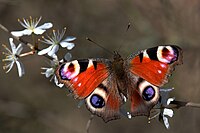
Photo from wikipedia
Thermal stress at one life stage can affect fitness at a later stage in ectotherms with complex life cycles. Most relevant studies have focused on extreme stress levels, but here… Click to show full abstract
Thermal stress at one life stage can affect fitness at a later stage in ectotherms with complex life cycles. Most relevant studies have focused on extreme stress levels, but here we also show substantial fitness effects in a moth when pupae are exposed to a relatively mild and sublethal heat stress. We consider the impact of a 35°C heat stress of 2h in three geographically separate populations of the oriental fruit moth (OFM, Grapholita molesta) from northern, middle and southern China. Heat stress negatively affected fecundity but increased adult heat resistance and adult longevity. Fitness effects were mostly consistent across populations but there were also some population differences. In the Shenyang population from northern China, there was a hormetic effect of heat on female longevity not evident in the other populations. Adults from all populations had higher LT50s due to heat stress after pupal exposure to the sublethal stress. These results highlight that the pupal stage is a particularly sensitive window for development and they have implications for seasonal adaptation in uncertain environments as well as changes in pest dynamics under climate warming.
Journal Title: Journal of insect physiology
Year Published: 2017
Link to full text (if available)
Share on Social Media: Sign Up to like & get
recommendations!